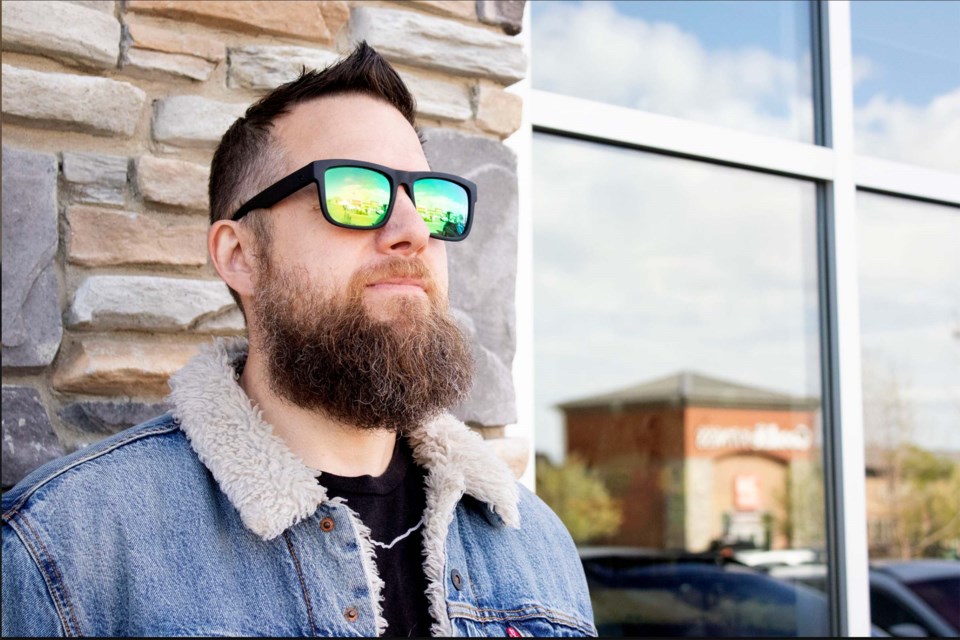Airdrie director and documentarian Jeremy Pollock is set to wrap up film production on a project about lesser-known Canadian war hero Léo Major – a short film he’s spent 13 years working on.
The 20-minute documentary-style film will have a mix of reenactments and interviews that Pollock conducted following research and communication with the Major family.
A World War II veteran, Major served with the Régiment de la Chaudière and landed on the beaches of Normandy during the Allies’ D-Day invasion of France on June 6, 1944. Throughout his initial five-year service during the war, Major captured a German armoured vehicle and 93 soldiers by himself, according to the Canadian Encyclopedia.
After reading an article about war heroes, Pollock noticed a comment stating that Major was missing from the article.
“I read a lot of stories and I’m always looking for inspiration and something about the story just kind of gripped me,” Pollock said after the online comment sparked his interest in the Canadian war hero.
Pollock added he was particularly drawn to Major’s courage.
“I can imagine that going into a battle with a group of people compared to by yourself is a totally different thing,” Pollock added.
Although many of Major’s accomplishments happened in the Netherlands, most of Pollock’s film was shot in Alberta.
“It was always going to be all Alberta, it was just a matter of how far can [we] push it to make it look like [it was] in Europe,” Pollock said.
According to Pollock, a lot of the film was shot in Sylvan Lake, but some scenes were filmed in Calgary. Those watching the film might recognize a sandstone school located in the Inglewood neighbourhood of Calgary.
“[We called] Calgary police, saying ‘Hey, just to let you know, I’ve got a guy in a World War II uniform and a bunch of guns on his back walking around in the city’,” Pollock added.
The director said he chose the location because the old school site in Inglewood was reminiscent of a school building in Europe.
Although Pollock feared that making an Alberta backdrop look like a convincing Europe would be difficult, funding proved to be the biggest challenge of the production. He explained how the project was stalled a few times due to monetary issues, which is part of the reason why the film took 13 years to create.
After pitching to some major studios, interest in the film “fizzled out a little bit” and unfortunately so did funding for the film, according to Pollock.
However, the director didn’t let a few funding shortages stop him from completing the project.
“This little documentary budget that I’m working with, after our first take…I knew right then that we had something special going on,” Pollock said.
Wrapping up the film this August, Pollock is hoping to release the documentary in 2023, although a definitive date will depend on the film festival circuit.
The director would love to see his movie premiered at the Cannes or Sundance film festivals, but his sights are set on more genre-specific festivals like Hot Docs – a Canadian International Documentary Film Festival that highlights the art of documentary film-making and showcases over 200 films from around the world.
“I think it’ll find a home in a lot of different places,” Pollock said, adding the film has a diverse genre, being not just a documentary but a war movie as well.
Different film festivities have different entry dates, Pollock explained, but some submission deadlines are in August, which cuts it close for Pollock to submit his film.
“I’ve been at this for over a decade now so I’m not in any rush to get it out there. I’d rather just do it the right way,” he said.
For Pollock, the main goal is to tell the story of Canadian war hero Leo Major, and he hopes he has done that with the dedication it deserves.
“Léo is the kind of guy who deserves to be remembered and thought about because of his selflessness and his ability to put others first and to try to help,” Pollock said. “I don’t want to say he was trying to be a hero, but in doing the things that he did, he was a hero. That needs to be remembered.”



